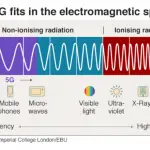Last Updated on 1 year by Francis
As technology advances at an unprecedented rate, so do our concerns about its possible negative effects on our health. One such concern is the potential harm caused by electromagnetic fields (EMF) emitted by electronic devices. In this essay, we will explore what EMF is, its possible effects on our health, and whether or not you should worry about it.
https://www.youtube.com/watch?v=1MI_fa5YsgY
As we live in a world where technology is constantly evolving, concerns about the potential health risks of electromagnetic fields (EMF) are becoming more prevalent. EMF is present in everything from cellphones to microwaves, and some worry that long-term exposure to EMF could have negative effects on our health. In this article, we will explore the question: Should you worry about EMF?
What is EMF?
EMF is a type of energy that is emitted by electronic devices such as cell phones, laptops, and Wi-Fi routers. This energy is in the form of electromagnetic waves that travel through the air and can be absorbed by our bodies. EMF is measured in units called milligauss (mG), and the higher the level of EMF, the greater the potential for harm.
Types of EMF
There are two types of EMF: ionizing and non-ionizing. Ionizing EMF is the high-energy radiation that is emitted by x-rays and can cause damage to our DNA. Non-ionizing EMF, on the other hand, is the low-energy radiation that is emitted by electronic devices and is not powerful enough to cause DNA damage.
Sources of EMF
EMF is emitted by a wide range of electronic devices, including cell phones, laptops, Wi-Fi routers, smart meters, and power lines. The amount of EMF emitted by these devices varies, and some are more powerful than others. For example, the EMF emitted by a cell phone is much lower than that emitted by a power line.
Possible Effects of EMF on Our Health
There is still much debate about the possible effects of EMF on our health. Some studies have suggested that exposure to high levels of EMF may increase the risk of cancer, while others have found no link between EMF and cancer. Other possible health effects of EMF include headaches, dizziness, and fatigue.
One key takeaway from this text is the importance of taking a precautionary approach to EMF exposure. While the evidence surrounding the potential health effects of EMF is not conclusive, many experts agree that limiting our exposure as much as possible is a wise choice, particularly for children and pregnant women. This can be achieved through simple steps such as using a wired internet connection, keeping devices away from the body, limiting electronic device use, and using EMF shielding products. Ultimately, it’s better to be safe than sorry when it comes to our health and exposure to EMF.
The Precautionary Principle
Despite the lack of conclusive evidence about the effects of EMF on our health, many experts recommend taking a precautionary approach. This means limiting our exposure to EMF as much as possible, especially for children and pregnant women. This approach is based on the principle that if there is a possible risk to our health, we should take steps to minimize that risk.
How to Reduce Your Exposure to EMF
Reducing your exposure to EMF is relatively simple and can be done by following these steps:
One key takeaway from this text is that while the evidence about the effects of EMF on our health is inconclusive, many experts recommend taking a precautionary approach to limit our exposure to EMF as much as possible. This can be done by using wired connections for internet, keeping electronic devices away from our bodies, limiting device use, and using EMF shielding products. The precautionary principle of minimizing risk, even with inconclusive evidence, is particularly important for children and pregnant women who may be more vulnerable to the negative effects of EMF.
1. Use a wired connection
When possible, use a wired connection for your internet connection rather than Wi-Fi. This will reduce your exposure to EMF.
2. Keep devices away from your body
Avoid keeping electronic devices such as cell phones close to your body. Instead, use a hands-free device or speakerphone.
3. Limit your use of electronic devices
Limit your use of electronic devices, especially at night. Exposure to EMF can disrupt your sleep, so it’s best to avoid using electronic devices before bedtime.
4. Use EMF shielding
There are a variety of EMF shielding products on the market, including cell phone cases and laptop shields. These products can help reduce your exposure to EMF.
The Precautionary Principle
The precautionary principle is a guiding principle that is used in many areas of public health. It states that if there is a possible risk to our health, we should take steps to minimize that risk, even if the evidence is inconclusive. This principle is based on the idea that it’s better to be safe than sorry.
The precautionary principle is particularly relevant when it comes to EMF. While the evidence about the possible effects of EMF on our health is inconclusive, there is enough concern among experts that many recommend taking steps to minimize our exposure to EMF. This is especially important for children and pregnant women, who may be more vulnerable to the effects of EMF.
FAQs – Should You Worry About EMF
What is EMF?
EMF stands for Electromagnetic Field. It is a type of energy that is present all around us in the form of electric and magnetic fields. We are exposed to EMF from various sources including mobile phones, Wi-Fi, power lines, and electronic devices.
Should I be worried about EMF exposure?
EMF exposure from everyday electronic devices is generally considered safe. The World Health Organization (WHO) states that there is no evidence to suggest that exposure to low-level EMF poses any significant risk to human health. However, some studies have suggested that prolonged exposure to high levels of EMF can increase the risk of cancer and other health problems.
What are the symptoms of EMF exposure?
There is no conclusive scientific evidence to suggest that low-level EMF exposure causes any symptoms. Some people may report experiencing symptoms such as headaches, fatigue, and difficulty sleeping, but these symptoms are not unique to EMF exposure and can be caused by a range of factors.
How can I reduce my exposure to EMF?
You can reduce your exposure to EMF by using electronic devices responsibly. This means limiting your use of mobile phones and other wireless devices, keeping your phone away from your body when not in use, and using a hands-free kit when making calls. You can also use wired connections instead of Wi-Fi and avoid spending long periods near high-voltage power lines and other sources of high-level EMF.
Are some people more at risk of EMF exposure?
There is no evidence to suggest that some people are more at risk of EMF exposure than others. However, some people may be more sensitive to EMF and may experience symptoms at lower levels of exposure. If you are concerned about your exposure to EMF, you should consult your doctor.







